China’s soaring role in Latin America and how Miami fits in
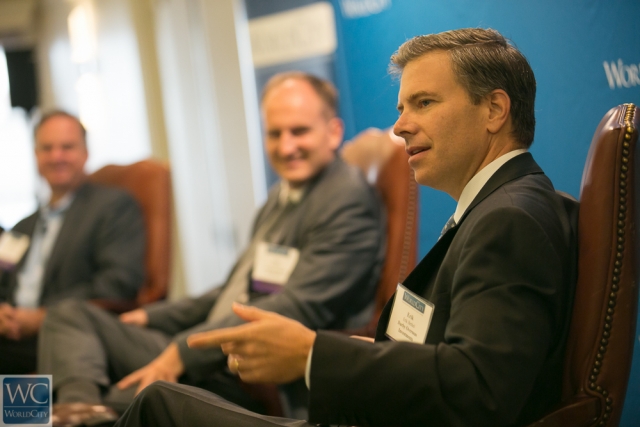 Former China resident Erik Bethel was jogging near his home in the Miami area recently, when he overheard some tourists speaking Mandarin. He stopped to chat.
Former China resident Erik Bethel was jogging near his home in the Miami area recently, when he overheard some tourists speaking Mandarin. He stopped to chat.
“Foreigner, “ a Chinese visitor asked Bethel, “how much is that house?”
“$2 million,” Bethel said, pictured in the foreground above.
Answered the Chinese visitor, “Is that it?”
Bethel, a financier, cited that incident to highlight trends in China’s business relations with Miami.
The Chinese are increasingly coming as tourists, and they’re willing to buy real estate, he said.
But so far, they are not looking at South Florida as a hub for business with Latin America. They prefer instead to do business with Latin America directly from their Asian homeland.
“The Chinese view [Miami] as an American city, and America to some degree is a rival to China in Latin America,” said Bethel, who lived eight years in Shanghai and led SinoLatin Capital there. “And that’s really the biggest obstacle” to the Chinese investing in Miami as a gateway for the Americas.
China’s booming links with Latin America and Miami’s role were the focus of WorldCity’s Global Connections held Oct. 31, when Bethel shared the panel with two others familiar with China business.
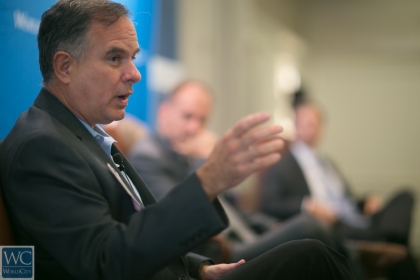
Bob Rodriguez, chief executive of NPN Media
Bob Rodriguez, chief executive of NPN Media, is bullish that Miami can become a regional hub for China, based on the young generation “that can get instant information anywhere, any time.”
Yet the challenge remains both for his video-sharing company and Miami overall: Can we create the bridge between Mandarin and Spanish for communication?, Rodriguez asked.
John Price, managing director of Americas Market Intelligence, thinks not. History matters, and Miami is the only major American city with no significant Chinese population and no Chinatown, he said.
For arriving Chinese, “there is no comfort level,” said Price, who lived in Hong Kong in his youth.
Price believes Miami may play a more limited role as a logistics hub or in managing Chinese capital.
Chinese private-equity entering Latin America
Is Chinese private capital coming to Miami already?, asked audience member Alberto Navarro, president of Internava Group.
Some high net-worth individuals from China are investing, including parents of Chinese students attending Miami area universities who see deals in local real estate, said Bethel.
But private equity funds from China are not yet coming. “What private equity funds in China are doing is dipping their toe in Latin America directly,” said Bethel, who runs the Latin American private equity division for Darby Overseas Investments. Lenovo’s fund, for example, recently invested in a blueberry venture in Chile, widely viewed as the most stable country in Latin America for investment, said Bethel.
Why China has become a superpower in Latin America
China’s ties with Latin America have soared since the 1990s for a simple reason, Price said.
Latin America has natural resources, such as metals, crops and oil, and it needs capital and technology to exploit them. China needs those resources and has cash and equipment to deploy. Chinese investors tend to tolerate more risk than U.S. counterparts, so they’re investing heavily in emerging markets.
“It’s kind of a match made in heaven,” said Price – except for the cultural gap between China and Latin America. He likened the union to “an arranged marriage between two novios who don’t know each other.” It takes a bevy of accountants, lawyers and other brokers to bridge that cultural gap, said Price.
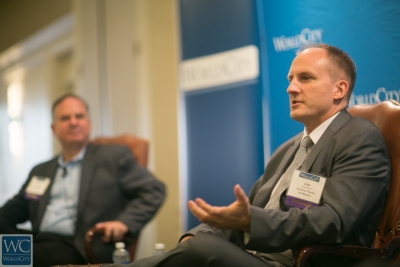
John Price, managing director of Americas Market Intelligence
China now ranks as the No. 1 trade partner for some Latin American nations. Its demand has been setting the pace for much of Latin America’s growth. What’s the outlook for China’s economy?, asked Marta Clark, vice president of software company Adobe Systems for Latin America and the Caribbean.
China soon will overtake the United States as the world’s largest economy, Price said. And that’s only natural for the world’s most populous country. Indeed, China had the biggest economy for most of world history, “except for a 225-year aberration,” said Price. “We don’t need to be afraid.”
Questions surfaced about the future of China’s communist leadership.

Rodriguez saw recent Hong Kong protests as a sign that one day, “that lid is going to blow.”
But Price disagreed. He recalled a time decades back in Hong Kong when he lost the subway ticket he needed to exit the station. He jumped the turnstile. About 300 people, “all stopped and hissed at me.”
“The Chinese put social order before individual rights. We put individual rights before social order,” Price said, cautioning the audience not to project their own values on China. “The last thing the Chinese want is another revolution,” after they saw Mao’s rule lead to millions of deaths.
Tips for business in China
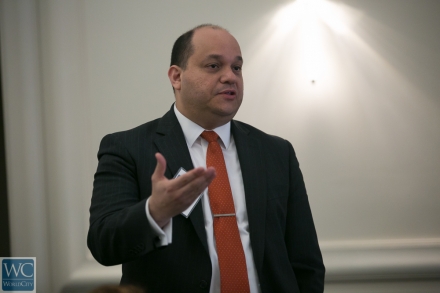
Hernando Gomez, director of the business valuation and litigation department at accounting and dvisory firm Moririson Brown Argiz & Farra LLC.
What can South Florida companies sell to China, and what are tips for doing business there?, asked Hernando Gomez, director of the business valuation and litigation department at accounting and advisory firm Morrison Brown Argiz & Farra LLC.
The Greater Miami Chamber of Commerce is organizing a business mission to China, Gomez said.
The key to business is cultural, said Bethel. The way Americans do business is “unique in the world,” based not on relationships but on rule of law. Americans will sign contracts over e-mail with people they’ve never met, confident that laws will be enforced.
Latin Americans, in contrast, do business first with their family and long-time friends. To enter their circle requires sharing dinners, soccer games and family events before you can broach a deal, he said.
Similarly, to enter Chinese circles, you need to sing karaoke, drink lots of strong baijiu alcohol, and “when you are three sheets to the wind and singing Air Supply, then you can do business,” said Bethel. “But that doesn’t take one trade mission. That requires you going over and over and making friends.”
Bethel’s advice for doing business in China: “Think like a Latin, not like an American.”
That’s also true for communication with the Chinese, added Price. He tends to write even e-mails to Chinese contacts in a flowery style similar to Spanish, instead of the more direct style used in English.
Diversity among Chinese in South Florida
Chinese culture is not monolithic, of course.
The small Chinese community in South Florida is highly fragmented, said WorldCity’s head of research Michelle Yan, a Chinese-American born in Colorado. It includes Chinese-born Chinese (CBCs), American-born Chinese (ABCs), some Taiwanese, some Hong Kongers and some Latin-born Chinese.
Those born in Latin American and Caribbean nations such as Peru or Jamaica may not speak Mandarin or Cantonese and are sometimes are “considered not as Chinese,” said Yan.
How Miami can lure more Chinese business
How would you market Miami in China?, asked Ken Roberts, WorldCity’s president.
Miami could open a business promotion office in Shanghai or Beijing, separate from the Enterprise Florida offices in China, to raise its profile, said Bethel.
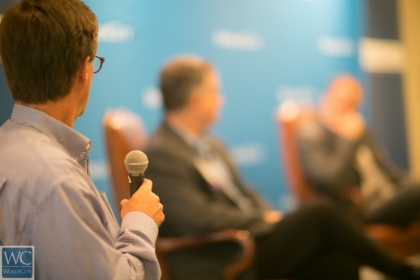
It also would help to have good Chinese food in South Florida, Bethel said. He recalled how employees from Shanghai would fill suitcases with food, such as duck tongue snacks, to take on trips overseas.
“Build the food,” joked Bethel, “and they will come.”
Global Connections is one of six event series organized by media company WorldCity to bring together executives in greater Miami on international business topics.. The Global series is sponsored by Florida International University school of business, public relations firm Edelman, real estate company Waterford and air-conditioner maker Daikin.
The next Global Connections is WorldCity’s second annual Latin America Energy Forum set for Nov. 21 from 8 a.m. to 10 a.m. at the Hyatt Regency hotel in Coral Gables.
For an article from a 2011 WorldCity event on Miami as a nexus between China and Latin America, click here.